Round 1 Decision Week is Here: Harvard, Northwestern Invites Arriving Soon

At 12 p.m. EST, Harvard Business School will unveil its round 1 MBA decision invites, leading a busy week for U.S. schools.
Tomorrow, Wednesday, December 13, will feature the first round of invites for Northwestern University’s Kellogg School of Management, with the Stanford Graduate School of Business, Berkeley Haas, and The Wharton School at the University of Pennsylvania following on Thursday, December 14. And on Friday, December 15, Rice Jones, UCLA Anderson and UMD Smith will reveal their first round invites.
A handful of notable Clear Admit favorites, such as the CMU Tepper full-time MBA, Dartmouth’s Tuck School of Business, Michigan Ross, and Washington Olin, among others, will also be releasing their own first round of MBA invites.
Clear Admit offers a host of valuable tools and advice for those waiting on the edge of their seats, including MBA LiveWire, DecisionWire, and ApplyWire.
Stay up to date with MetroMBA and Clear Admit for more information on the world’s best business schools and upcoming invites.
Southern California Wild Fires Cause UCLA Anderson Campus Closure

As wildfires rage in Southern California, UCLA Anderson School of Management has been forced to cancel classes for the past two days. The Skirball Fire, named for the Skirball Cultural Center near where the fire is believed to have originated, broke out early Wednesday morning. It also caused the closure of the famed Getty Center and Museum. The fire is just one of four blazes currently burning in areas around Los Angeles as powerful Santa Ana winds combine dangerously with extremely dry conditions.
All classes since yesterday, December 6, were cancelled across the entire UCLA campus, including at the business school. While the campus itself was reported to be safe, difficult traffic conditions related to the fire prevented many students, faculty, and staff from reaching the school, leading to the decision to cancel classes. The fire caused a complete closure of the 405 Freeway, a main artery in the congested Los Angeles region.
The official UCLA twitter account announced today’s cancellations late last night:
UCLA cancels all Thursday classes given the uncertainties caused by the fire near campus. https://t.co/fT8T32lGsk
— UCLA Newsroom (@UCLAnewsroom) December 7, 2017
For periods Wednesday, UCLA was forced to operate on internal power only, required that power be cut to non-essential buildings. The UCLA Department of Recreation also cancelled all outdoor recreation for the remainder of the day and recommended that members of the community avoid outdoor activity and strenuous indoor activity due to air quality concerns.
USC Marshall School of Business, located 13 miles east of UCLA closer to downtown Los Angeles, was unaffected by the blaze, though it retweeted a message of support from the larger University of Southern California for any students affected by the wildfires and encouraging affected students and their families to take advantage of student counseling services.
Stay tuned to MetroMBA and Clear Admit for more updates on the wildfire as it is revealed.
This article has been edited, updated, and republished on our sister site, Clear Admit.
Los Angeles MBA Programs that Specialize in Supply Chain Management

As businesses grow and develop, it’s up to supply chain managers, or SCMs, to effectively ensure that all goods and services are delivered in a quick, optimized manner.
SCMs are the logistical overlords of any major operation—they oversee how all the parts of their product, including raw materials, information, and finance, move from supplier, to manufacturer, to wholesaler, to retailer, and finally to the consumer.
As more and more MBA students and graduates find employment as SCMs, more business school have added courses and concentrations in supply chain management, including some top business schools in the Los Angeles metro.
If you’re a prospective MBA in the City of Angeles, take this deeper dive into these LA metro MBA programs.
The Best Los Angeles Supply Chain Management MBA Programs
Anderson School of Management – UCLA
While the UCLA Anderson School of Management doesn’t offer a concentration or major in supply chain management, related coursework is recommended for MBAs on the consulting specialization, including 240F – Supply Chain Management. The course is taught by Chris Tang, UCLA Distinguished Professor and Edward W. Carter Chair in Business Administration. Tang is a foremost scholar on supply chain management, having published more than 100 articles and five books.
The course explains how supply chains work and how to deal with many of their strategic and tactical challenges. Topics covered in the class include:
- Issues and opportunities brought by the Internet and the rise of e-business
- Instabilities caused by inadequate information-sharing
- Outsourcing
- Strategic alliances
Graziadio School of Business and Management – Pepperdine University
The Graziadio School of Business and Management offers not only one, but two specialized MBA programs that offer supply chain coursework: the Digital Innovation & Information Systems MBA and the Full-Time Applied Analytics MBA.
The Digital Innovation & Information Systems MBA is available to 15 and 20-Month MBA students and focuses on bridging the gap between business and technology. All electives in this program are offered in a blended learning format with one elective course scheduled per 7-week period and requires two Saturdays of on-campus class sessions at the West Los Angeles Graduate Campus, with the remaining coursework offered online. Related coursework includes DESC 634 – Supply Chain Management.
The Full-Time Applied Analytics MBA is an immersive program that prepares students through a core curriculum is built around Decision Sciences and Information Systems and Technology Management, with Global Business and elective course requirements to round out your education, such as DESC 627 – Supply Chain Management Analytics. The class places a strong emphasis on the development and use of analytics-based models to illustrate the underlying concepts involved in both intra-and inter-firm logistics operations.
YOU MAY ALSO LIKE: The Best Nonprofit MBA Programs in Los Angeles
Loyola Marymount University – College of Business Administration
The Loyola Marymount University College of Business Administration offers a Purchasing and Supply Chain Management Online Training Program. While not an MBA program or part of a graduate degree program, this online certificate program teaches fundamental aspects of the supply chain environment, including enterprise resource planning systems, requirement systems, interrelationships between purchasing, vendor selection, sources of supply, and more. This program is a good choice for those looking for project management experience.
Marshall School of Business – USC
Similarly to Marymount, the USC Marshall School of Business offers a graduate certificate program in Optimization and Supply Chain Management. Offered in partnership with the Viterbi School of Engineering, the program focuses on areas such as product introduction, strategic procurement, outsourcing, logistics and distribution, information technology and its role in managing global supply chains, and supply chain optimization. Units earned in the process of completing the certificate can usually be applied to an MBA degree and successful completion of the graduate certificate is documented on the graduate’s USC transcript and acknowledged with a certificate (diploma) issued by the University of Southern California.
Peter F. Drucker and Masatoshi Ito Graduate School of Management – Claremont Graduate University
The Peter F. Drucker and Masatoshi Ito Graduate School of Management offers supply chain management as an area of concentration for their MBA program. Students on this track explore concepts of supply chain management while learning to leverage technologies like big data, analytics, optimization, and geospatial systems.
Drucker is also home to the Center for Supply Chain & Logistics. After launching in 2015, the Center has partnered with business, government, trade, and policy leaders to enhance the performance of supply chains globally and the economic performance of the region. Partnership with companies like Toyota have created wonderful opportunities for students, such as the Toyota Women of Achievement Scholars program, which aims to create the future of supply chain by empowering women to take the lead in this vital field. The fellowship provides female scholars with a top notch education and formal mentor programs with other women leaders and career guidance to make the most of their degrees.
Do Social Networks Affect Our Brains? Two Tuck Professors and a UCLA Professor Research the Truth

We’re you surprised by the results of the 2016 election? According to Tuck Associate Professor of Business Administration Adam Kleinbaum and his research partners—Dartmouth Associate Professor of Psychological and Brain Sciences Thalia Wheatley and UCLA Social Psychology Assistant Professor Carolyn Parkinson—you can blame social media.
In their latest paper, “Spontaneous Neural Encoding of Social Network Position,” the group reviewed how surrounding ourselves with a close-knit group of like minds, such as on social media, can have real-world consequences in politics, business, and more. According to their paper, there’s something called the “naked emperor effect” that occurs when we fall into the trap of only relying on information from trusted networks. The phrase, taken from The Emperor’s New Clothes, explains the tendency of people to place themselves in a bubble to exchange information that no longer holds true.
For their research project, Kleinbaum and Wheatley set out to answer the question, “Do friends see the world in the same way? And if so, what are the implications of that?” To gain insight into the question—including how social networks interact with the physical structure of the brain—they asked 42 first-year Tuck students to watch a series of videos while hooked up to an fMRI machine. They found some interesting results.
According to the scans, the more similar two people’s neural responses the more likely that they would be friends. From this, the authors’ surmised that people who have similar world views are more likely to be friends and that spending time together causes “neuroplastic convergence,” or a physical change in the brain to react similarly. Basically, the human brain can and will evolve to recognize one’s place in a group.
The implications of this research can have some profound effects for companies. Since most people tend to interact with like-minded people and to increase cohesion with their network overtime, this can create a false sense of security. The key is to help your employees be exposed to different ways of thinking.
“Executives worry a lot about being able to anticipate the next big thing, or being disrupted if they fail to anticipate the next big thing,” Kleinbaum explained. “Being exposed to different ways of thinking helps us break out of our thought worlds and imagine possibilities we otherwise might never have thought of.”
To read a more in-depth review of the research paper visit the news release on the Tuck School website. Or you can find the full paper in the April issues of Nature Human Behavior.
This article has been edited and republished with permissions from Clear Admit.
UCLA Anderson Breaks Ground on New $40 Million Marion Anderson Hall

On October 19th, UCLA Anderson School of Management broke ground on a new state-of-the-art building on campus: Marion Anderson Hall. The hall was made possible thanks to an unprecedented $100 million gift from benefactress Marion Anderson in May 2015—$40 million of which was earmarked for the building. The groundbreaking ceremony was attended by Dean Judy Olian, Senior Associate Dean Al Osborne Jr., UCLA Chancellor Gene Block, and Marion Anderson Hall donors: Sam Tang (MBA ’87), Donald and Sherie Morrison, Bob Wilson (BS ’53), Luis (MBA ’02) and Lindsey Serrano, and Heather Hasso. Continue reading…
Finding the Best Laptop for Business School

Brand. Affordability. Technical specifications.
In no certain order, these principle factors are the three pillars to consider when purchasing a laptop. For prospective business school students, despite having very different priorities than your average consumer, these three factors tend to weigh above everything else. However, before starting any MBA program, there are a few more things that they may need to consider.
Finding The Right Laptop for Business School
The UCLA Anderson School of Management, one of the world’s most familiar business school institutions, gives incoming students a comprehensive guide of what kind of laptop they’ll need before starting the MBA program.
Like many business schools, most of the software required by the UCLA Anderson MBA program run on the Windows operating system. As we previously mentioned, this is primarily because business school students are expecting to utilize familiar programs like Microsoft Excel. Windows is the standard operating system for most computers, however, it can be installed on Macs for optimal use.
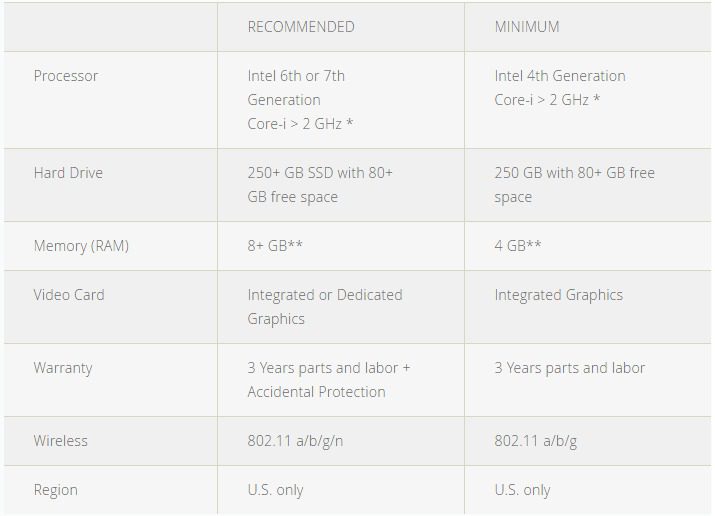
Technical specifications recommended for UCLA Anderson MBA students.
Many of the specifications UCLA Anderson details in their recommendations for students, such as the 4 GB of memory, come standard with most mid-level to premium-level laptops. For the unfamiliar, 6th and 7th generation processing units are also standard for any recently-purchased PC. The last 4th generation Intel processor was shipped in early 2015.
Using UCLA Anderson’s guideline as an informal rule of thumb, we’ve broken down what optimal devices you should be looking for if you’re enrolling in an MBA program, or need an immediate upgrade while you continue your studies.
Looking for Something Affordable
For those in the market for a more affordable machine or are concerned their recently purchased Chromebook isn’t up to par, there are more options than ever in the affordable laptop market. The Acer Aspire E 15, the world’s best-selling laptop, is among the most affordable bets available. Lauded by Laptop Mag, which called it the best sub-$500 laptop on the market, the Acer Aspire E 15 starts at a surprising $350, or, $429 coupled with Windows Office. The standard $350 model comes with an Intel i-3 7th generation processor and 4 GB of standard memory with numerous upgrade options available.
For a slightly larger investment, however, MBA students may be hard-pressed to look at the Lenovo ThinkPad 13.
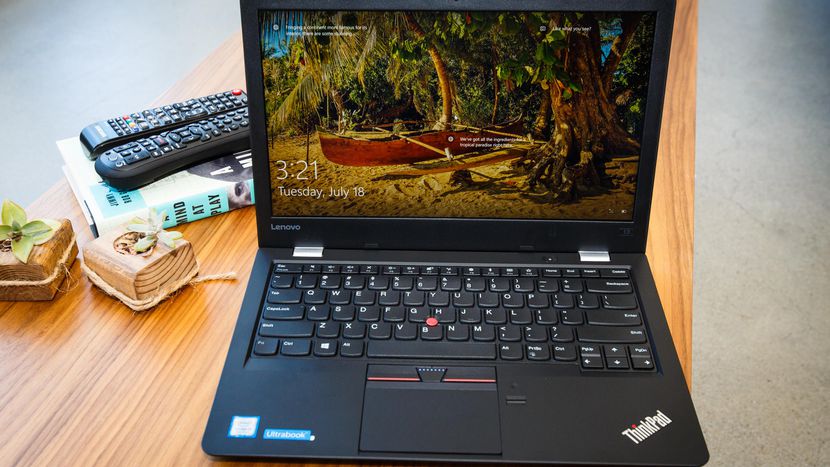
Lenovo ThinkPad 13/Photo via CNet
The ultra-durable (military-tested, in fact) ThinkPad has become a staple model for the business community. Starting at just under $500, the ThinkPad 13 has numerous available upgrades with an astounding 12-hour battery life. For those enrolled in or joining an MBA program, the model comes with a standard 4 GB of memory, but requires an upgrade to an Intel 7th generation processor.
The Optimal Mid-Tier Option
For those looking to invest a bit more in your purchase, Dell’s mid-tier XPS and Inspiron models might be the best machine upgrades without going the bank-breaking route.
The award-winning XPS models have become the crown jewel of the laptop market for the past few years, rewarded by outlets like Laptop Mag, PC Magazine, and TechRadar as one of the best computers on the planet. The XPS 13, starting at $799, comes packed with the latest 7th generation Kaby Lake Intel processor, providing a visual performance that cannot be matched by even the best affordable options. With some welcoming but not totally necessary upgrades, the not-yet-released 2018 model will sport a slightly reduced price even with the fully-packed new specs, including the 8th generation Intel i-7 processor, 8 GB of memory and 256 GB of SSD storage. Still, for MBA students, the standard XPS 13 or slightly larger-sized XPS 15 are more than enough to start.
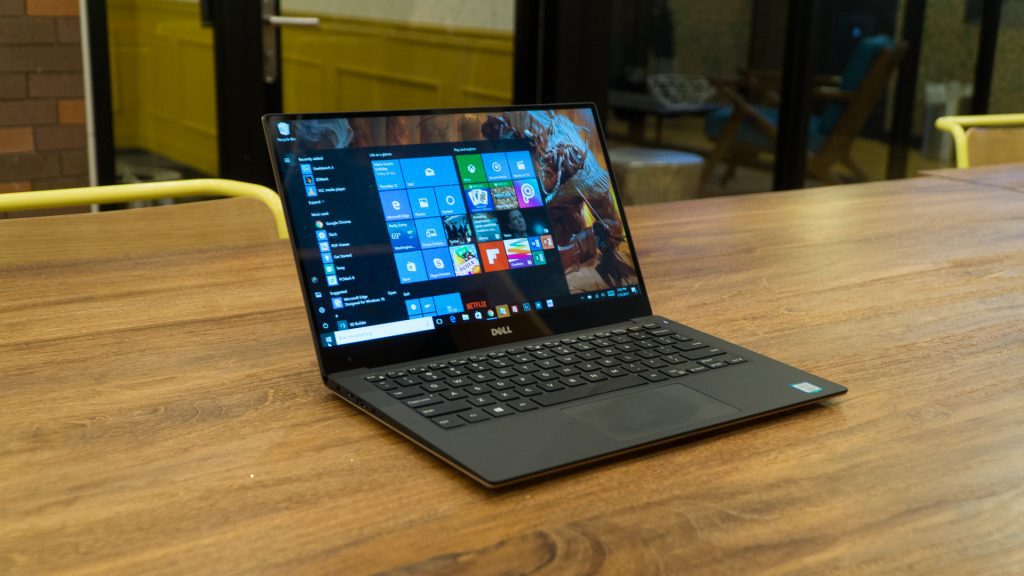
Dell XPS13/Photo via TechRadar.
High Rollers
No one will argue going for the affordable route, but, let’s be honest for a moment. If you’re seriously considering enrollment in an MBA program, or are already enrolled in business school, dishing out a couple hundred more bucks for a top-tier laptop model doesn’t even come close to tuition rates. Plus, if you’re looking at the new laptop as an investment, then providing some more resources might be the best choice you can make.
Beyond the $1,000 benchmark, the aforementioned Mac becomes obvious. The visually-stunning new MacBook Pro may be the most hip offering out there, even with the $1,499 starting price tag (which jumps to $1,799 with the giddy TouchBar). The 13″ MacBook Pro boasts some of the sleekest industrial design of any available model, although without any available USB ports. To make the machine slimmer than the competition, Apple, to a sea of complaints and curious convictions, eliminated much of the standard ports included in most laptops in favor of adaptable Thunderbolt C ports. For the business student, the model may not seem to be precisely necessary. But for entrepreneurs looking to expand a brand with world-class designs and presentation, there may be no better accompanying device.
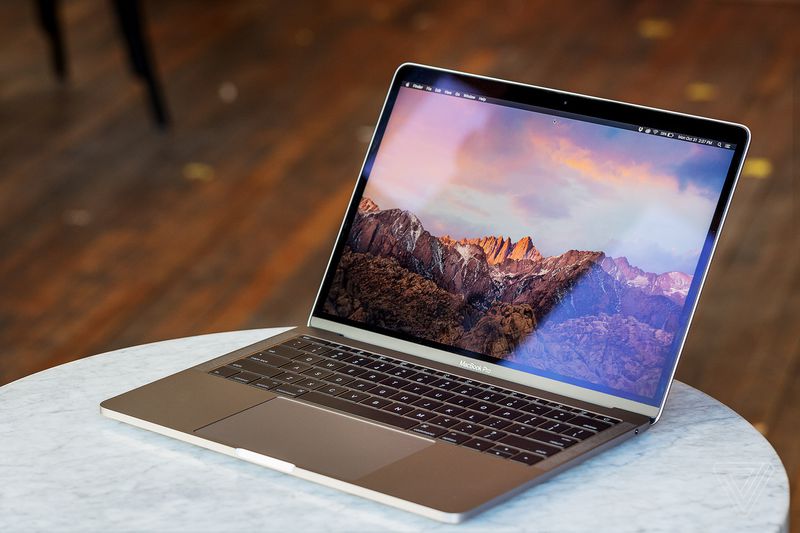
The new MacBook Pro/Photo via Verge.
Still, foregoing a machine that comes complete with Windows OS isn’t recommended for MBA students. For those that prioritize sleek exterior design and slim portability, then why not go right to the source? Microsoft’s endearing Surface Pro is among the world’s most beloved models, called the “Best Laptop Right Now” earlier this year by Verge.
“Microsoft’s new Surface Laptop is the best laptop for most people because it blends power, portability, and battery life better than any other computer. It has a great keyboard and trackpad; a beautiful, high-resolution touchscreen; and comes in four different colors. It uses Intel’s latest processors and can be specced out with up to 16 GB of RAM and 1 TB of storage.”
Like the aforementioned Dell XPS 13, the Surface starts at $799, but fully modifying the machine is probably the way to go. Unlike the other models mentioned, however, Surface Pro owners have the option to immediately upgrade to Windows 10 Pro for free. This offers easily usable features welcome to any business school climate, along with the standard Intel 7th generation processing unit.
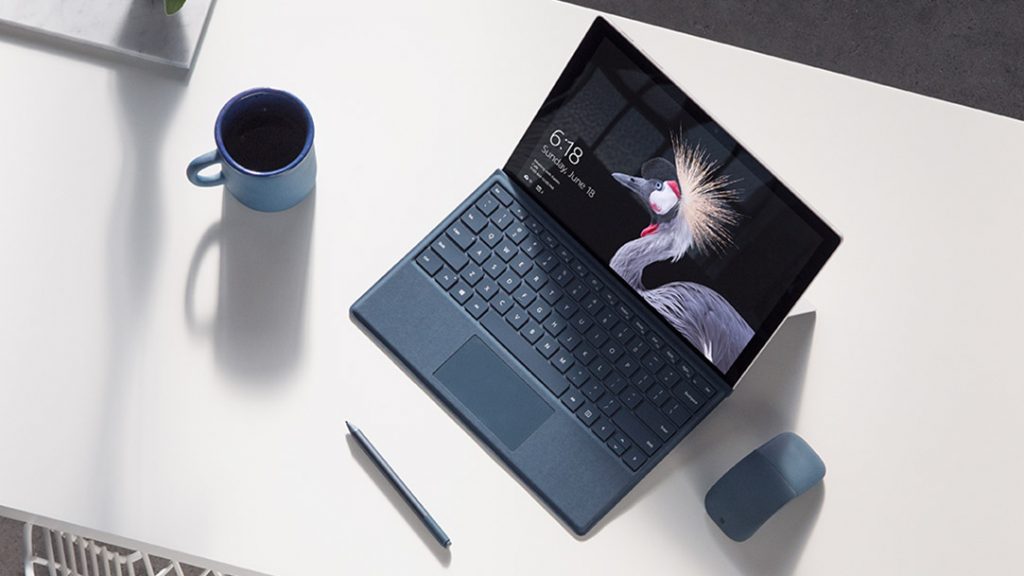
Microsoft Surface Pro/Photo via Microsoft
When Should You Buy a New Laptop?
According to Cnet, the right time to buy a laptop might not be so obvious, like Black Friday. Rick Broida writes, “Sure, you’ll see some low-end laptops priced to move, but high-end models—gaming laptops, ultraportables and the like—don’t usually see big Black Friday price cuts. Rather, history suggests that these machines sell for less in the summertime, during back-to-school sales.
For those looking to invest in a higher-end model, do not expect sales any time soon—if at all. Optimally, whichever laptop you have must be ready before the start of the MBA program. Some schools, like the aforementioned UCLA Anderson School of Management, require a laptop review months before the program begins, so a purchase is better made sooner than later.
